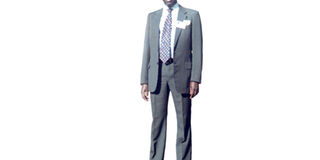Remembering John F Kennedy’s inaugural address

Harold Acemah
What you need to know:
- Contrast. The theme of Trump’s inaugural speech was “America first” which contrasts sharply with Kennedy’s address.
Human memory is amazing. There are events which have remained alive in my memory as if they occurred only yesterday. Among such events are the day I left home in 1959 to attend boarding school; the day I was confirmed a Christian by Bishop Keith Russell in 1960; the day I left West Nile for the first time in 1961 to travel to Sir Samuel Baker School, Gulu; Uganda’s Independence Day – October 9, 1962 and the day I arrived at Makerere University in June 1967 to begin my undergraduate course.
In addition, I remember watching on film, in 1961, at Gulu, John Fitzgerald Kennedy’s inauguration as the 35th President of the United States of America. I read the full text of Kennedy’s eloquent and historic speech many years later. Today is the 58th anniversary of the great speech.
When he took the presidential oath of office in Washington DC on January 20, 1961, Kennedy, at 43 years old, was the youngest person and the first Catholic to be elected president of the USA. Kennedy’s contemporaries, such as Nikita Khrushchev of Russia, Harold MacMillan of Britain, Konrad Adenauer of West Germany and Gen Charles de Gaulle of France were all in their late 60s and 70s which reminds me of the dynamic Ethiopian Prime Minister, Dr Abiy Ahmed who, at 42 years old, must feel like a new kid on the block among senile and tired African leaders in their 70s, 80s and some who don’t actually know their real age!
Unlike long, winding and meaningless speeches African leaders often bore us with, Kennedy’s inaugural address was short, concise and displayed clarity of thought. Kennedy used simple vocabulary and sentences, but his message was powerful, loud and clear for the American and international audience.
Two years ago, on January 20, 2017, President Donald Trump took the same oath of office which Kennedy took at the same venue. The theme of Trump’s inaugural speech was “America first” which contrasts sharply with Kennedy’s address. It’s not surprising that my memory decided to ignore Trump’s self-centred and worthless speech though made recently.
Kennedy’s inaugural address
President Kennedy began his address in a typically American way by invoking freedom which most African countries, including Uganda, are denied by corrupt, incompetent and ruthless dictators. “We observe today, not a victory of party, but a celebration of freedom symbolising an end as well as a beginning, signifying renewal as well as change. For I have sworn before you and Almighty God the same solemn oath our forebears prescribed nearly a century and three-quarters ago,” he said.
He added, “… the same revolutionary beliefs for which our forebears fought are still at issue around the globe; the belief that the rights of man (read human rights) come not from generosity of the state, but from the hand of God.” Regrettably, in many African countries, including Uganda, governments behave as if human rights are a favour granted by sitting African presidents to citizens for loyalty, obedience and servitude to oppressive incumbent regimes. It’s despicable, false and unacceptable!
In a clear warning to the other superpower of the times, namely USSR, Kennedy said, “Let every nation know, whether it wishes us well or ill, that we shall pay any price, bear any burden, meet any hardship, support any friend, oppose any foe, to assure the survival and the success of liberty.” This was a favourite quote of my friend and classmate, Albert Yobo (RIP). In October 1962, the USSR tested the young president’s resolve during the Cuban missile crisis. Kennedy stood his ground with courage and emerged victorious.
For a president who pioneered the American Peace Corps, Kennedy made this promise to third world countries. “To those people in the huts and villages of half the globe struggling to break the bonds of mass misery, we pledge our best efforts to help them help themselves, for whatever period is required; not because the Communists may be doing it, not because we seek their votes (at the UN), but because it is right.”
In 1963, many Ugandan schools, including Sir Samuel Baker benefited from this promise when we welcomed five American Peace Corps teachers at school in Gulu.
where hitherto nearly all the teachers were British.




